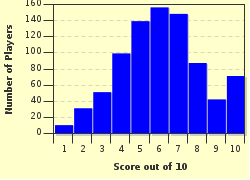Quiz Answer Key and Fun Facts
1. Who was the King of the English in the year 1000 A.D.?
2. The average Englishman in 1000 A.D. would have been very short by modern standards.
3. Anglo-Saxons subsisted on a localized and seasonal diet. Which of the following foods was available to Englishmen at the end of the tenth century?
4. Nicknames were popular amongst the Anglo-Saxons. What, however, was the most common surname in England during this year?
5. What is true about the majority of Englishmen in 1000 A.D.?
6. At the turn of the millennium, a new bride would be presented with a 'morgengifu'. What was it?
7. Clothing was important to the Anglo-Saxons, as it denoted one's status and wealth. What fabric was used for making clothes in 1000 A.D. England?
8. Religion was at the root of daily life for the Anglo-Saxons. What was the primary religion in England in 1000 A.D.?
9. The most common types of weapons used for fighting in 1000 A.D. England included all of the following EXCEPT:
10. The Anglo-Saxons loved to adorn themselves with trinkets. During this year, what metal was used to make the jewelry worn in England?
Source: Author
pagiedamon
This quiz was reviewed by FunTrivia editor
bloomsby before going online.
Any errors found in FunTrivia content are routinely corrected through our feedback system.


